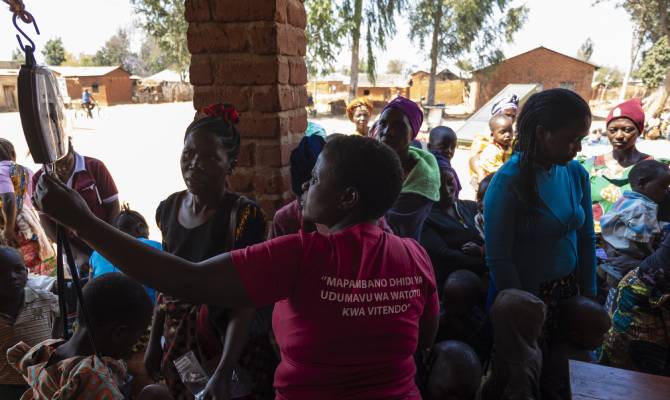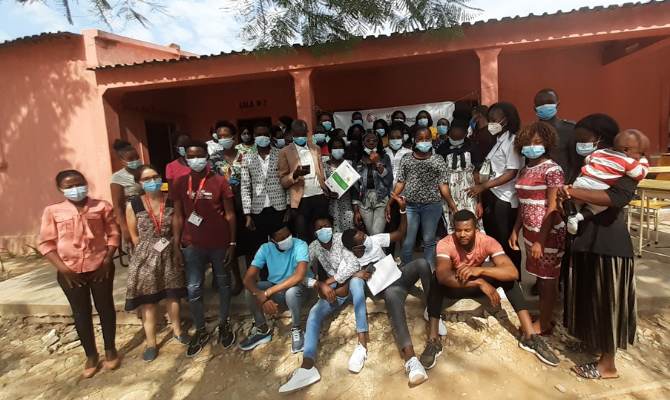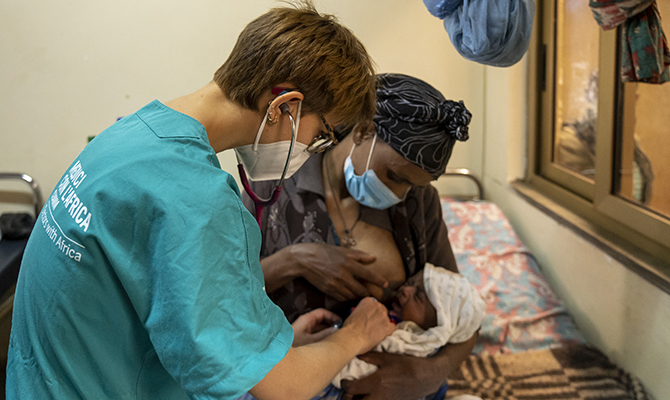As usual, even more so this year, Doctors with Africa CUAMM participated to the world week for maternal breastfeeding launched by the World Alliance for Breastfeeding Action (WABA), supporting and promoting in its daily commitment in the field the importance of breastfeeding to ensure a healthy development of children and to prevent malnutrition.
Why?
9.8% of world population does not have regular and daily access to food. A staggering 828 million people suffered from hunger in 2021, 46 million more from 2020 and 150 million more from 2019. An estimated 2.3 billion people worldwide (29.3 percent) lived in moderate or severe food insecurity in 2021, 350 million more than the previous year. About 45 million children under the age of five are malnourished.
Africa carries the heaviest burden
One in five Africans, the 20.2%, suffered from hunger in 2021. These are the alarming figures from the United Nations SOFI 2022 Report on food insecurity and nutrition worldwide, a reflection of the sanitary and economic impact of the Covid-19 pandemic, of the intensification of extreme climate change effects and of conflicts, resulting in a drastic growth in inequality. A scenario further aggravated by the ongoing war in Ukraine, which brought global supply chains to a halt, causing an increase in the prices of grain, fertilizer, energy, and ready- to-use therapeutic food (RUTF) necessary for children with severe acute malnutrition.
Commitment to the field
The world week for maternal breastfeeding then, becomes another opportunity to strengthen the work of maternal and child health intervention done in the various countries, also as part of the program “Mothers and Children First. People and Skills.”
From Ethiopia to Mozambique, from Uganda to the Central African Republic, there have been many initiatives to raise awareness and educate about the importance of exclusive breastfeeding, particularly in the first six months of a child’s life, which is crucial to health and development and, consequently, to the well-being of society as a whole.
In Ethiopia
In Ethiopia, about 58% of children are exclusively breastfed for the first six months (EDHS 2016). This rate is due to the fact that, contrary to the recommendation, many infants are also fed with water, herbal remedies or are early initiated to complementary food other than breastmilk before turning six months old.
“During the recent conflict in cities near Jinka, in South Omo, we have seen children survive to the crisis just trough breastfeeding – recounts Eleni, Ethiopian paediatrician at CUAMM – When mothers get to the hospital with their children sometimes they cannot procure enough food for the journey and for their stay. Most of the times the only source of food for these children is breast milk. We also hospitalized some infants because they had been fed solid foods and herbal remedies that caused them gastroenteritis, dehydration, gastrointestinal bleeding and sepsis. These cultural practices are deeply rooted and widespread. Therefore, we try to educate all hospitalized mothers on what exclusive breastfeeding is and how important it is for their health and that of their little ones. In addition, training was given to health workers, according to WHO guidelines – Eleni continues – It is the health workers, then, who teach mothers good practices during health education activities in hospitals and in the community. In June, we held an updating course for more than 30 operators, concentrating on the importance of initiating breastfeeding in the early hours of life and how to facilitate and practice it properly, using instructional videos.”
In Mozambique
Neonatology at Beira Central Hospital is divided into two areas: kangaroo and intensive care – reports Elena Altieri, Cuamm’s paediatrician in Beira, in Mozambique –. In the former, skin-to-skin contact between mother and baby is encouraged, including through the very practice of kagaroo, breastfeeding or the feeding of extracted breast milk in premature infants who still have sucking problems. In the latter, on the other hand, are the most critical infants who are admitted without their mothers, but even in this case, preference is always given to the administration of extracted breast milk. Every day, when mothers visit, they are encouraged to pump milk, explaining the countless benefits that breast milk has for their babies. A course on managing obstetric and neonatal emergencies for ambulance and peripheral health center nurses was held in recent weeks – recalls Elena – In the section on the newborn, the importance of initiating early breastfeeding in the first hour of life in the delivery room was widely emphasized.”
However, the difficulties are not absent, and the indirect effects of Covid-19 have also affected Beira Hospital, as Maria Luisa, a local neonatology nurse, recounts: “Regarding rural areas, we have the problem of transferring babies from locations far away from Beira. When mothers are not hospitalized, the distance and cost of transportation prevent them from coming to the hospital several times a day and therefore from breastfeeding their baby as often as necessary. With the pandemic, these difficulties have been exacerbated and only now does the situation seem to be improving and the use of extracted breast milk has increased again.”
In Uganda
In Uganda, the promotion of breastfeeding is part of the normal “package” of activities provided for maternal and newborn health. At the health center level, Cuamm supports the training of midwives and the practice of breastfeeding is explained especially during prenatal visits. At the village level awareness is raised through radio messages and during community discussions and meetings with village health teams (VHTs), the village community workers. However, there are some regions where Cuamm works, such as Karamoja, where in recent years, climate change and the current food crisis are having a major impact on breastfeeding, mothers, not having quality food for themselves, are not able to produce nutritious milk for their babies.
Never before has the widespread adoption and promotion of breastfeeding been so crucial: it can prevent 20,000 maternal deaths from breast cancer and 823,000 infant deaths a year (The Lancet), as well as decrease economic losses and the burden on countries’ health systems.
In Sierra Leone
“I had my first daughter at 24 years old and I knew nothing about breastfeeding. I had no one to “teach” me how to raise a child because I had lost my mother seven years earlier – tells us a mother during an awareness meeting at the PCMH hospital in Freetown, Sierra Leone – At the time, I was feeding my one-week-old baby girl with both my milk and water and therefore she became ill with pneumonia. It was not until my second pregnancy that I started learning a lot about exclusive breastfeeding, hygiene, weaning and taking care of my babies in the hospital, thanks to the health workers. I am grateful for the support I received.”
In Central African Republic
In CAR, health awareness and education activities take place in the yellow code waiting room, triage and wards. The main messages are about hygiene, before and after breastfeeding, and the benefits of exclusive breastfeeding to strengthen the immune system and improve the child’s growth and cognitive development.
Breastfeeding support is a public health issue, a collective responsibility that requires investment at all levels.





